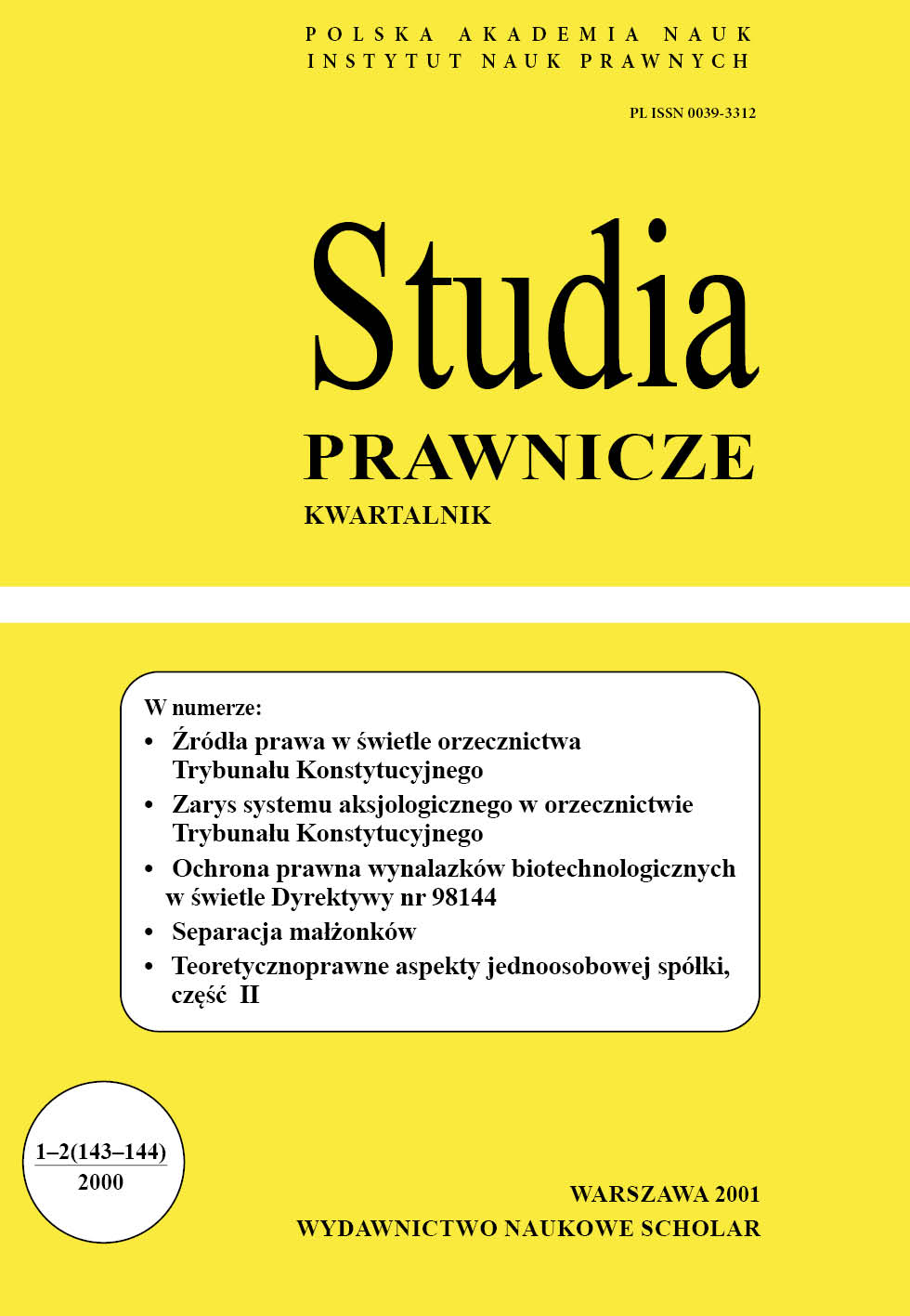Separacja małżonków
Separation of spouses
Author(s): Tadeusz SmyczyńskiSubject(s): Law, Constitution, Jurisprudence
Published by: Instytut Nauk Prawnych PAN
Keywords: spouses; separation; family law
Summary/Abstract: The court may pronounce separation despite the requesting spouse's sole fault, as the family and guardianship code does not provide for such a negative condition. There may be a temptation to take into account the fault of the spouse requesting separation as part of the contradiction of the request with the principles of comity. The view against such an interpretation of Article 61-1(2) of the family and guardianship code appears to be correct, as the removal of the fault premise was deliberate and not an editorial omission. Transferring this negative premise to the institution of separation would lead to an exacerbation of the marital conflict and weaken the chance of saving the marriage.A consensual request for a declaration of separation is only a basis for applying a certain procedure and simplifying the divorce procedure, just as Article 57 § 2 of the family and guardianship code instructs the court not to state the fault if the spouses consensually request it.The wording of Article 61-1 § 3 of the family and guardianship code “consensual request" and from Article 567-1 § 1 of the code of civil procedure “consensual request" should refer not only to a joint request in the form of a pleading, but also to a request by one spouse and a consensual request by the other spouse expressed in a pleading before and during the first hearing. This interpretation appears to correspond to the intention of the legislator and, moreover, it does not change the jurisdiction of the court nor it delays the proceedings.The independence of the two legal institutions (separation and divorce) lies in the fact that each of the requests is considered by the court according to the grounds provided, i.e. if there is a complete and permanent breakdown of the marriage, the court pronounces divorce at the request of the spouse, even though the other spouse requests separation. If, on the other hand, the court cannot pronounce a divorce on the grounds that the premise for the permanence of the relationship breakdown does not exist, or that the demand for divorce is contrary to the principles of social co-existence, or is requested by a spouse who is solely to blame, the court will consider the demand for separation.In the event that separation is pronounced, the maintenance obligation of the innocent or guilty spouse is linked to the premise of deprivation of the other spouse. On the other hand, the maintenance obligation of the wholly guilty spouse arises even in the absence of deprivation, if the financial situation of the innocent spouse has materially deteriorated as a result of the separation. The postulate of recrimination against the solely guilty spouse therefore also affects spouses requesting separation. It does not, however, apply to spouses who have unanimously requested no determination of fault be made (Article 57 of the family and guardianship code) or who have filed a consensual application for a declaration of separation. In such cases, consequences follow as if neither spouse was at fault and, consequently, the maintenance obligation is linked to the condition of deprivation of the entitled spouse.The court decides on parental authority over a joint minor child. It would seem that, since the spouses unanimously request that the separation be lifted, their reconciliation is a circumstance that excludes court interference in the internal affairs of the family. However, the legislator's optimism is very cautious with regard to the proper formation of the child's relationship with the parents; the court is required to re-examine the exercise of parental responsibilities after the separation has ceased. This caution is justified by the fact that the court, when pronouncing the separation, has already established the way in which parental authority is exercised, e.g. by entrusting custody of the child to one spouse and assigning certain duties and powers to the other spouse. When the separation is lifted, an automatic return to the previous situation may not in all cases be in the best interests of the child, especially if the separation of the spouses has lasted for a long time.The final decision to terminate the separation itself results in the cessation of the forced separation of property regime. However, the spouses may have an interest in continuing the property separation and, if they make a consensual request to this effect, the court cannot rule otherwise than to continue this property regime. However, it is no longer coercive in nature and it is possible to change it by a matrimonial property agreement.
Journal: Studia Prawnicze
- Issue Year: 2000
- Issue No: 1-2
- Page Range: 151-161
- Page Count: 10
- Language: Polish

